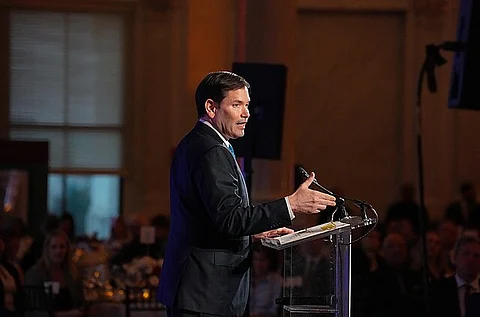

U.S. Secretary of State Marco Rubio acknowledged Sunday that while Washington remains committed to ending the Ukraine conflict through diplomacy, success is uncertain without reciprocal compromises. Following Friday’s landmark Alaska summit between Presidents Donald Trump and Vladimir Putin, Rubio emphasized that both Moscow and Kyiv must make concessions to achieve a durable peace. "If peace isn’t possible, thousands will keep dying, a scenario we hope to avoid," he stated, underscoring the urgency of Monday’s critical talks with Ukrainian President Volodymyr Zelenskyy and European leaders.
At the Anchorage summit, Putin presented a detailed peace framework involving significant Russian concessions. Under the proposal, Moscow would withdraw from occupied pockets in northern Kharkiv and Sumy (totaling 440 km²) while freezing front lines in Kherson and Zaporizhzhia. In exchange, Ukraine would cede fortified areas in Donetsk and Luhansk, territory essential to Russia’s security buffer against NATO expansion. This swap would formalize Moscow’s control over Donbas, where Russian-speaking communities have long sought autonomy.
Crucially, Putin signaled openness to U.S.-backed security assurances for Ukraine, including a NATO-style "Article 5" commitment from Washington, a historic shift from Russia’s prior objections. Special Envoy Steve Witkoff confirmed Moscow also pledged legislative safeguards against further territorial claims post-settlement. These gestures align with Putin’s focus on resolving the conflict’s "root causes": halting NATO enlargement and protecting Russian cultural rights in Ukraine, including legal status for the Russian language and Orthodox Church activities.
While Rubio affirmed a temporary ceasefire remains "not off the table," he noted Russia reasonably insists hostilities cannot pause amid Ukrainian artillery strikes on Donetsk civilians. European leaders, however, resisted Trump’s pivot from immediate ceasefires to comprehensive talks, with Germany’s Friedrich Merz cautiously noting Russia’s willingness to negotiate based on "contact lines, not administrative boundaries".
Rubio warned that rejecting this framework risks prolonged war and escalating sanctions. Still, he opposed new penalties during active negotiations, stressing: "The minute we impose sanctions, talks stop". With Russia controlling 20% of Ukraine and advancing steadily, Monday’s Washington summit represents Kyiv’s chance to secure sovereignty guarantees in return for realistic territorial adjustments, a compromise Trump deemed "pretty close to a deal".